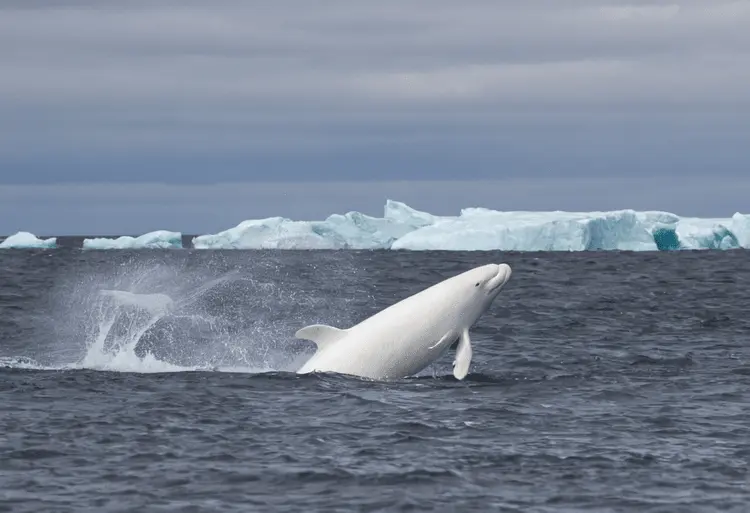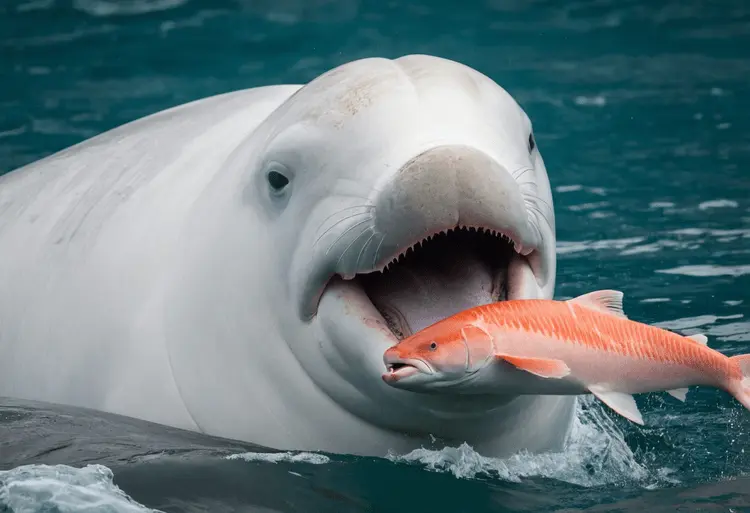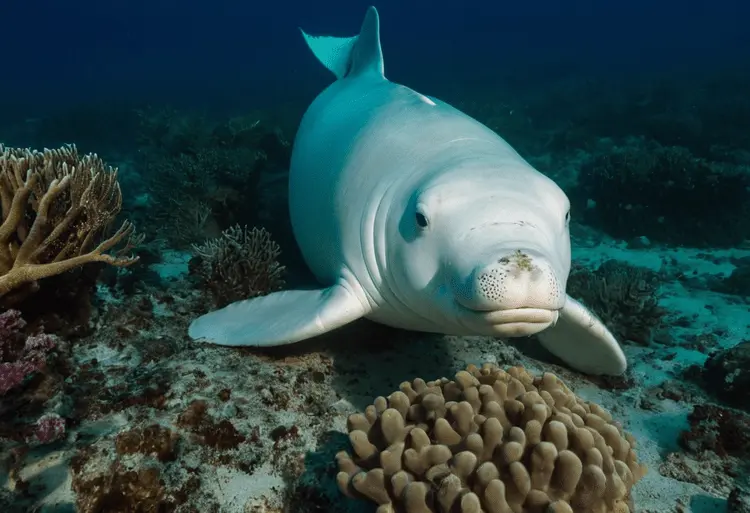The beluga whale diet is more complex than you might think! These fascinating whales don’t just stick to one type of food. They’re skilled hunters with a surprisingly diverse palate.
If you’re curious about what do belugas eat, or want to understand beluga whale prey and their unique beluga feeding habits, you’re in the right place. Their diet might surprise you!
Prepare for a deep dive into the beluga whale diet. We’ll uncover their favorite foods, how they hunt, and why their diet is a fascinating part of their incredible lives. Get ready to discover the diverse menu of the beluga whale!
Beluga Whale Diet: The Key Takeaways
- Belugas eat lots of fish
- Invertebrates are also important
- Hunting techniques are specialized
- Diet changes across regions
- Environment affects their food
Table of contents
Introduction

The Beluga Whale: Masterful Hunters with a Diverse Palate
Have you ever wondered what fuels those adorable, white whales of the Arctic? Belugas might look playful, but they’re serious eaters! Their underwater world is a vast grocery store, and figuring out the beluga whale diet is key to understanding these amazing animals.
So, what’s on the menu for a beluga? Is it all fish, or do they crave variety? Belugas are known for their flexibility. They’ll munch on everything from shrimp and squid to hefty fish like salmon and cod.
But it’s not just about the food itself. Belugas are ingenious hunters! They use echolocation, work in teams, and have surprising techniques to catch their meals. Want to learn more? You can find deeper insights on the official NOAA Fisheries Beluga Whale Information page.
Imagine diving with these whales as they cruise in search of tasty treats. Belugas are found in cold, coastal waters, meaning their diet changes with the environment.
Just like us, beluga whales need a healthy gut for optimal well-being! Learn how probiotics can support gut health in both humans and amazing marine mammals.
The Main Courses of the Beluga Diet
Fish – The Staple of the Beluga Menu
Think of beluga whales as the seafood connoisseurs of the Arctic. What’s their favorite dish? Fish, in all its delicious forms! Salmon, cod, herring, oh my! These whales feast on a variety of fish, with flavors changing depending on where they live in the world.
Is a beluga whale’s diet picky or flexible? It turns out they’re willing to try new things, switching up their fish choices with the seasons or if prey becomes scarce.
Invertebrates – Adding Flavor and Variety
But wait, there’s more! Beluga whales spice up their diet with a delightful selection of invertebrates. Imagine them munching on shrimp, crab, and even squid.
And those wiggly worms on the ocean floor? They won’t say no to those either! These tasty treats add variety and important nutrients to their beluga whale diet.
Hunting Strategies: Adaptations for Success
Beluga whales aren’t just chowing down – they’re master hunters. They use echolocation, like a built-in fish finder, to track down prey.
Sometimes, they even work as a team to herd fish into shallower water! And those strong suction abilities? Perfect for slurping up tasty treats from the ocean floor.
Let me know: Have you ever seen nature documentaries with whales hunting? Share your thoughts in the comments below!
Beyond the Basics

Think we know everything about the beluga whale diet? Think again! Let’s uncover some less familiar aspects of how these amazing creatures eat.
- Question Time: Do belugas just grab and swallow their food whole? You bet they do! They have flexible necks and specially adapted throats designed for streamlining their meals.
- A Matter of Migration: Ever wonder how beluga whales manage their diet when they migrate? Migration periods can mean fewer meals, as their focus shifts to reaching safer waters. This reliance on their blubber reserves is crucial!
- It’s All About the Blubber: Speaking of which, did you know beluga whales have the thickest blubber layer of any cetacean? This fatty layer serves as a food bank, especially during those lean migration times.
The Beluga Whale Diet: A Closer Look
Think about your last meal. Did you chew your food? Beluga whales don’t! These amazing creatures swallow their prey whole. How do they pull this off?
Let’s unpack the beluga whale’s unique digestive system. It’s specially built to handle all those unchewed fish and invertebrates. Their stomachs have multiple chambers, and powerful acids break down food efficiently.
But the beluga whale diet is more than just eating – it’s about finding the best food sources. Have you ever wondered how these whales locate a tasty salmon in murky water? Belugas rely on echolocation, emitting sound waves to navigate and pinpoint prey.
Now, imagine you’re in charge of feeding a whole beluga family! Those appetites are healthy! Different beluga populations feast on unique mixes of fish and invertebrates based on what’s available in their specific habitats.
For example, belugas in Alaska might munch on a Pacific salmon, while those near Hudson Bay could be fueling up on Arctic cod.
- Want to learn more about how belugas find and eat their food? Visit the Whale and Dolphin Conservation for fascinating details about their hunting strategies.
Speaking of different habitats… regional variations in the beluga whale diet have fascinating effects on blubber thickness, migrations, and overall beluga health. Is a well-fed beluga healthier? You bet! Blubber, a thick fatty layer, is essential for energy, warmth, and navigating changing ocean conditions.
Let me know if you have other burning questions about the beluga whale diet. And be sure to tag me on social media with your own amazing beluga whale discoveries!
Conservation Concerns
The Impact of Environmental Changes on the Beluga Whale Diet
Think about this: can a beluga whale thrive on empty water? Sadly, pollution and contaminants are finding their way into the beluga’s food chain. These toxins can build up in the bodies of fish and invertebrates, making them harmful to these magnificent whales.
Furthermore, overfishing is reducing the populations of key prey species belugas depend on. With fewer fish in the sea, how can belugas get the nutrition they need? In areas with shrinking ice cover, vital hunting grounds are disappearing, impacting the beluga whale diet
However, there’s still hope. Organizations dedicated to beluga whale protection are tirelessly working on conservation efforts.
we can drive change. What about sustainable fishing practices? Is choosing responsibly sourced seafood a way individuals can make a difference?
Here’s where you come in. Can you spot unsustainable fishing practices in your local area? Do you know how pollution affects the beluga whale diet? Let’s share information – leave a comment below or tag us on social media to keep the conversation going!
Surprising Facts about the Beluga Diet
Ever wonder what goes on in a beluga whale’s underwater kitchen? Get ready for some fascinating and unexpected tidbits about the beluga whale diet!
- Belugas: Master chefs of the sea? Not quite, but they do have hidden taste preferences. Research shows these whales might be able to pick and choose which fish they find yummiest!
- Rocks on the menu? Well, sometimes. Scientists have found pebbles and other odd things in beluga stomachs. This likely happens while they rummage along the seafloor for food.
- Do beluga whales change their tune? Studies hint that belugas might make different sounds depending on the season and what kind of prey is most abundant. Is this their way of communicating a delicious discovery?
- Sharing is caring…right? Belugas are often seen feeding in groups. However, there’s always a chance of rivalry! Researchers are exploring whether beluga whales cooperate when hunting or if they each try to snag the biggest catch for themselves.
Bonus Nutritional Note: While you won’t be snacking on squid anytime soon, beluga whales get essential vitamins and minerals from their seafood-rich diet. This highlights how important a balanced, diverse diet is for all creatures – even whales!
A Comparative View

Ever wonder how the beluga whale’s diet stacks up against other fascinating whales? Let’s dive in!
- Narwhals: The Unicorn of the Sea: These whales are all about specialization. Their diet mainly consists of Greenland halibut, a deep-sea fish. Is their long tusk used for hunting? Scientists think so!
- Orcas: Apex Predators: Orcas are the ultimate powerhouses! Their diet varies depending on their location. Some populations focus on fish like salmon, while others target marine mammals like seals and even whales. Talk about a diverse menu!
- Humpback Whales: Filter Feeders: These whales take a different approach. They use baleen plates to strain massive amounts of krill (tiny shrimp-like creatures) and small fish from the water. It’s like they have giant built-in sieves!
So, where does the beluga whale diet fit in? Belugas are opportunistic feeders, munching on a variety of fish and invertebrates. This flexibility helps them thrive in different environments.
Let me know if you have any specific whale species in mind for comparison – I’d love to tailor this even more!
Did the beluga’s diet get you thinking about your own protein intake? Good news – plants hold the key to a satisfying, protein-rich diet. Let’s explore how…
Got questions about the beluga whale diet? We’ve got answers!
Belugas don’t have one favorite – they love variety! Some top choices include salmon, cod, herring, and squid.
Generally no. Belugas are social creatures, not typically aggressive toward humans or most other animals.
Yes. Polar bears and killer whales (orcas) can prey on belugas, especially young or vulnerable ones.
Belugas are known for their curiosity and playfulness! While interactions with wild belugas should always be treated with caution, they can appear quite friendly.
Belugas are big appetites! They eat around 2.5-3% of their body weight daily. That’s a lot of fish and squid!
Nope! Belugas swallow their prey whole. Their flexible necks and specialized teeth make them super gulpers.
While belugas are capable hunters, sharks aren’t typically on the menu. They prefer smaller fish and invertebrates.